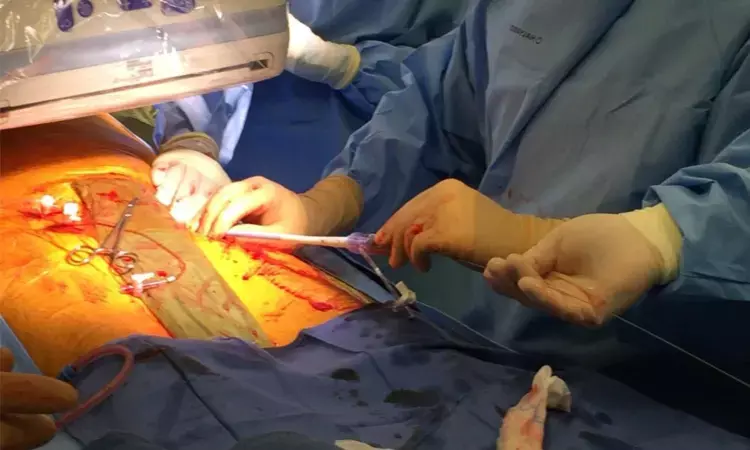- Home
- Medical news & Guidelines
- Anesthesiology
- Cardiology and CTVS
- Critical Care
- Dentistry
- Dermatology
- Diabetes and Endocrinology
- ENT
- Gastroenterology
- Medicine
- Nephrology
- Neurology
- Obstretics-Gynaecology
- Oncology
- Ophthalmology
- Orthopaedics
- Pediatrics-Neonatology
- Psychiatry
- Pulmonology
- Radiology
- Surgery
- Urology
- Laboratory Medicine
- Diet
- Nursing
- Paramedical
- Physiotherapy
- Health news
- Fact Check
- Bone Health Fact Check
- Brain Health Fact Check
- Cancer Related Fact Check
- Child Care Fact Check
- Dental and oral health fact check
- Diabetes and metabolic health fact check
- Diet and Nutrition Fact Check
- Eye and ENT Care Fact Check
- Fitness fact check
- Gut health fact check
- Heart health fact check
- Kidney health fact check
- Medical education fact check
- Men's health fact check
- Respiratory fact check
- Skin and hair care fact check
- Vaccine and Immunization fact check
- Women's health fact check
- AYUSH
- State News
- Andaman and Nicobar Islands
- Andhra Pradesh
- Arunachal Pradesh
- Assam
- Bihar
- Chandigarh
- Chattisgarh
- Dadra and Nagar Haveli
- Daman and Diu
- Delhi
- Goa
- Gujarat
- Haryana
- Himachal Pradesh
- Jammu & Kashmir
- Jharkhand
- Karnataka
- Kerala
- Ladakh
- Lakshadweep
- Madhya Pradesh
- Maharashtra
- Manipur
- Meghalaya
- Mizoram
- Nagaland
- Odisha
- Puducherry
- Punjab
- Rajasthan
- Sikkim
- Tamil Nadu
- Telangana
- Tripura
- Uttar Pradesh
- Uttrakhand
- West Bengal
- Medical Education
- Industry
SMART Trial Reveals Benefits of Self-Expanding Valves in Women with Small Aortic Annuli Undergoing TAVR

USA: A recent SMART randomized clinical trial analysis has revealed significant findings regarding Transcatheter Aortic Valve Replacement (TAVR) for women suffering from severe symptomatic aortic stenosis and small aortic annuli.
The study, published in JAMA Cardiology, revealed that the use of self-expanding valves (SEVs) showed comparable clinical outcomes to balloon-expandable valves (BEVs) while significantly decreasing the occurrence of bioprosthetic valve dysfunction over 12 months.
The researchers note that historically, women with aortic stenosis have faced poorer outcomes and less recognition than men, often being underdiagnosed and undertreated. Additionally, they have been underrepresented in clinical trials, further complicating their treatment and care. Considering this, Didier Tchétché, Department of Interventional Cardiology, Clinique Pasteur, Toulouse, France, and colleagues aimed to assess whether women with small aortic annuli undergoing transcatheter aortic valve replacement achieve improved clinical and hemodynamic outcomes with SEVs compared to BEVs.
The Small Annuli Randomized to Evolut or SAPIEN Trial (SMART) was a large randomized clinical trial examining patients with small aortic annuli undergoing transcatheter aortic valve replacement. Seven hundred sixteen patients were randomized to receive self-expanding or balloon-expandable valves at 83 centers across Canada, Europe, Israel, and the US from April 2021 to October 2022. This analysis focuses on the clinical and hemodynamic outcomes of the 621 women enrolled in SMART, with data analyzed from February to April 2024.
The intervention involved transcatheter aortic valve replacement using either SEVs or BEVs. The primary clinical outcome was a composite measure of death, disabling stroke, or heart failure-related rehospitalization, while the primary valve function outcome assessed the incidence of bioprosthetic valve dysfunction over 12 months. Secondary outcomes included the rate of moderate or severe prosthesis-patient mismatch.
The following were the key findings of the study:
- The analysis included 621 women (mean age 80.2 years), with 312 randomized to the SEV group and 309 to the BEV group.
- At the 12-month mark, there were no significant differences in the composite clinical outcome between the SEV and BEV groups (9.4% versus 11.8%, absolute risk difference −2.3%).
- SEV implantation resulted in significantly less bioprosthetic valve dysfunction (8.4% versus 41.8%; absolute risk difference −33.4%).
- SEVs also led to lower aortic valve gradients and larger effective orifice areas at 30 days and 12 months, along with reduced mild or greater aortic regurgitation at the one-year follow-up compared to BEVs.
- The incidence of prosthesis-patient mismatch was significantly lower with SEVs, regardless of the definition used or adjustments for body mass index.
- SEV use was associated with improved quality of life outcomes, as measured by the Valve Academic Research Consortium-3 ordinal quality of life scale.
"Our findings showed that in women with small aortic annuli undergoing TAVR, the use of self-expanding valves led to comparable clinical outcomes and improved hemodynamic performance compared to balloon-expandable valves," the researchers concluded.
Reference:
Tchétché D, Mehran R, Blackman DJ, et al. Transcatheter Aortic Valve Implantation by Valve Type in Women With Small Annuli: Results From the SMART Randomized Clinical Trial. JAMA Cardiol. Published online October 09, 2024. doi:10.1001/jamacardio.2024.3241
Dr Kamal Kant Kohli-MBBS, DTCD- a chest specialist with more than 30 years of practice and a flair for writing clinical articles, Dr Kamal Kant Kohli joined Medical Dialogues as a Chief Editor of Medical News. Besides writing articles, as an editor, he proofreads and verifies all the medical content published on Medical Dialogues including those coming from journals, studies,medical conferences,guidelines etc. Email: drkohli@medicaldialogues.in. Contact no. 011-43720751


